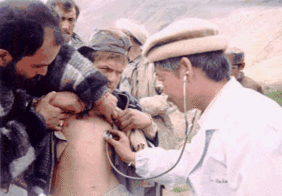The Laureate of the 1st Okinawa Peace Prize
“Peshawar-kai for its support of the work of Dr. Tetsu Nakamura”

“Peshawar-Kai for its support of the work of Dr. Tetsu Nakamura”(hereinafter referred to as “Pashawar-kai”) was established in 1983 to help Dr. Nakamura to conduct medical activities in Pakistan and Afghanistan. The activities have been carried out for the past 18 years. In an unspeakably difficult environment due to
civil war and social anxiety, they have been continuing selfless service overcoming several difficulties with a belief, “Go where other would not go. Do what other would not do,” and with the principle of nonviolence.
Their policy is to “Operate Peshawar-kai with the spirit of “mutual support”regardless of ideology and belief.” Locally, they have pursued a mission to provide equal service regardless of politics, ethnicity, religion and language. Through these activities, they have contributed in promoting the materialization of peace on the
basis of indigenous diversity.
The supporters who shared the belief with Peshawar-kai that has been conducting diligent activities have formed a network that expanded nationwide. The organization grew to having a membership of approximately 8000. The Peshawar-kai is funded by membership fee and donation. It does not have permanent staff, and
has minimized the operation cost so that most of the funding can be channeled to the local activities. This is an ideal form of NGO.
In 1986, Peshawar-kai established a project to assist refugees in Afghanistan. Currently, they operate 1 hospital and 4 clinics in Pakistan and Afghanistan and attend to approximately 300,000 patients annually.
In Afghanistan, devastated by serious drought, there is a shortage of drinking water and infectious disease is becoming an epidemic. Many precious lives have been lost, and the villages are being abandoned. The country is at a terrible state. In response, Peshawar-kai took prompt actions. They helped many people to carryout
their living by launching projects to secure water source, such as digging wells, at targeted number of 2,000 areas. This has prevented the villagers from becoming refugees.
In Japan, mainly for the purpose of supporting the local activities, Peshawar-kai is conducting fundraising programs. In places where refugee camp has become quite large, such places like Kabul in particular, Peshawar-kai has established “Afghan Life Fund,” a project for the people who are about to suffer from severely cold winter and
starvation. Peshawar-kai also provides information about the lives of people in Afghanistan, which deserves attention for the contribution made to international understanding of the situations.
Peshawar-kai has contributed to peace and human security through activities such as the practice in medical and primary health care. It has also shown devotion to rescuing human lives and securing basic human rights amidst such social anxieties such as the poverty, through activities of which achieved success in raising awareness
for universal peace. Simultaneously, Peshawar-kai has also effectively demonstrated the possibility of volunteer activities in Asia by the Japanese.
Toward reconstruction of Afghanistan, we can expect Pehsawar-kai to contribute to the stability of Asia-Pacific region by continuing with the medical service and water-source projects that they have been conducting in the past as well as other wide range of additional activities such as the new agricultural reconstruction project,
self-help assistance project for widows, and the road construction.
We are convinced that the diligent effort made by Peshawar-kai would reach many people to share in the same belief and that they will receive permanent support from both Japan and the overseas in the coming future, eventually developing into a powerful force to build peace.
The Okinawa Peace Prize Selection Committee highly commends the accomplishments made by Peshawar-kai. Okinawa, during the time it was called Ryukyu Kingdom, had an era during which the people actively played a role of being “bankokushinryo” or the “bridge between the nations” that linked Asian countries.
People of Okinawa also possess the tolerance to accept variety of things, the spirit of mutual help and the strength to create future. The activities of Peshawar-kai are in compliance with the principles set forth in Okinawa Peace Prize, which was established as a mean to create permanent peace reflective of Okinawa’s historical
and cultural characters.
For above reasons, it has been decided that Okinawa, which has developed through difficult time before and after World War II, will award Peshawar-kai the 2002 Okinawa Peace Prize so that their future activities may be supported.
1st Okinawa Peace Prize Selection Committee
Chairperson Leona Esaki (Shibaura Institute of Technology, President)
Hiroko Sho (University of the Air Okinawa Regional Study Cebter, Director)
Moshin Morita (University of the Ryukyus, President)
Katsuji Ebisawa (Japan Broadcasting Corporation, President)
Gregory Clark (Tama University, President Emeritus)
Kinhide Mushakoji (Chubu Institute for Advanced Studies, Director)
Kuniko Inoguchi (Delegation of Japan to the Conference on Disarmament, ambassador Extraordinary and Plenipotentiary)
![]()
このページに関するお問い合わせ
沖縄県 知事公室 平和・地域外交推進課
〒900-8570 沖縄県那覇市泉崎1-2-2 行政棟1階(東側)
電話:098-894-2226 ファクス:098-869-7018
お問い合わせは専用フォームをご利用ください。
